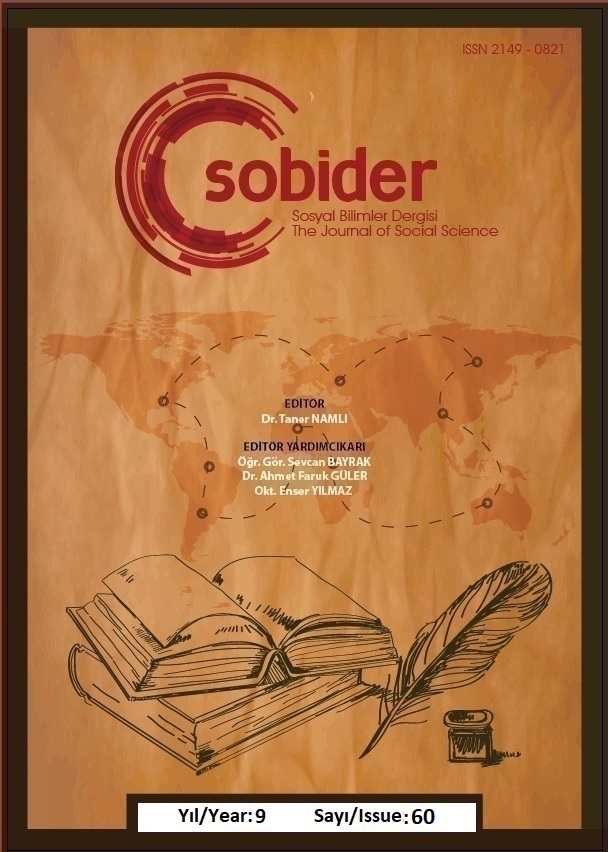Author :
Abstract
Antik Çağ Filozofu Sokrates’e dair sahip olunan bilgilerin neredeyse tamamı öğrencisi Platon’un eserlerinden edinilmiştir. Antik Çağ döneminde sistem kuran ilk filozof Platon’un, erdem üzerine sorgulamanın yapıldığı Menon Diyaloğu, Sokratik Yöntem kullanılarak oluşturulmuş bir diyalogdur. Sistemci filozof olmasına rağmen Platon’un dört döneme ayrılan diyalogları sistematik değildir. Diyaloglar kesin yargılarla sonlandırılmadan açık uçlu ifadelerle bitirilerek düşünmeye yönlendirir. Geçiş dönemi eserlerinden olan Menon Diyaloğu’nda erdemin ne olduğunu ortaya koymak için çeşitli tekil örneklerden hareketle evrensel tanım elde edilmek istenir. Platon, erdem kavramı hakkında parçalanmayan, herkes tarafından kabul edilebilecek, evrensel bir tanım ortaya koymayı amaçlamıştır. Böylece yalnız etik değil epistemoloji ve ontolojinin sorunlarına da değinen bir diyalog gelişmiştir. Ruhun ölümsüzlüğü ve nesnelerin, idealar dünyasının varlığının bir uzantısı, öğrenmenin de bir tür doxa (anımsama) olduğu tezi etrafında şekillenen diyaloğun analizine geçmeden Menon’un temsiledeceği Sokrates’ten önce erdem hakkında düşünen Sofistlerin ahlak anlayışı ve Menon Diyaloğu’unda kullanılan yöntem hakkında kısa bir tanımlamanın yapılması eserin analizini anlaşılır kılacaktır.
Keywords
Abstract
Almost all of the information about the Greek philosopher Socrates, who lived in the Ancient Age, was obtained from the works written by his student Plato. The Meno Dialogue of Plato who is the first philosopher who established a system in the Ancient Age, is a dialogue in which is a dialogue in which all stages of the method are embodied and created by using the Socratic Method in which the questioning on virtue is made. Despite being a systems philosopher, Plato's dialogues, which are divided into four periods, are not systematic. Dialogues lead to thinking by ending with open-ended statements instead of ending with definite judgments.In the Meno Dialogue, which is one of the works of the transition period, it is desired to obtain a universal definition based on various singular examples in order to reveal the knowledge of what virtue really is.As the dialogue had been established to reach information about virtue, it becomes a broad questioning about what mathematics and knowledge are and how to reach correct statements about them. Plato aimed to present a universal definition of the concept of virtue, which is unchanging, unbreakable, not open to discussion, and which can be accepted by everyone at all times.Thus, a dialogue has developed those addresses not only ethics but also the problems of epistemology and ontology. The immortality of the soul, and objects, and the existence of an extension of the world of ideas, a kind of learning doxa (reminiscence) is proceeding to the analysis of the thesis that is formed around that dialogue Socrates who thinks about the ethics of virtue before the sophists to be representative of Menon and Menon dialog a brief definition of the method that is used in the analysis of the work to be performed will make it clear
Keywords
- Arslan, A. (2006). llkçağ Felsefe Tarihi 2. İstanbul. İstanbul Bilgi Üniversitesi Yayınları.
- Birlik, V. (2013). Platon ve Aristotalesin Erdem Anlayışının Akıl Bilgi ve Mutluluk İle Olan İlişkisinin Karşılaştırılması. Yayımlanmamış yüksek lisans tezi, İstanbul Bilgi Üniversitesi Sosyal Bilimler Enstitüsü, İstanbul.
- Cevizci, A. (1999). Felsefe Sözlüğü. İstanbul. Paradıgma Yayınları.
- Çüçen, A.K. (2001). Bilgi Felsefesi. Bursa. Asa Kitabevi.
- Derbeder, F. (2007). Platon ve Aristotales’de Ruh ve Beden Karşılaştırması. Yayımlanmamış yüksek lisans tezi, Pamukkale Üniversitesi Sosyal Bilimler Enstitüsü, Denizli.
- Gülsoy, P. (2010). Platon’un Ruh Anlayışı. Yayımlanmamış yüksek lisans tezi, İstanbul Üniversitesi Sosyal Bilimler Enstitüsü, İstanbul
- Gültekin, T. (2019). “Mağara alegorisi ve simülasyon bağlamında ruh-beden”. Düşünbil Dergisi. 78, 44-49.
- Platon, (2010). Diyaloglar. Adnan Cemgil (çev.), İstanbul: Remzi Kitabevi.
- Platon, (2018). Menon. Özlem Bayoğlu (çev.), İstanbul: Pinhan Yayıncılık.





